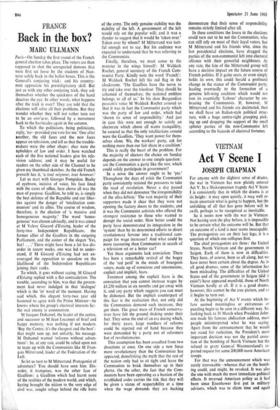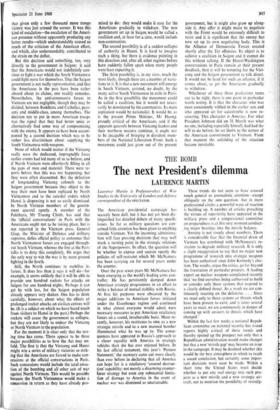Act V Scene I
VIETNAM JOSEPH CHAPMAN
For anyone with the slightest sense of drama, the war in Vietnam has now plainly entered Act V. In a Shakespearean tragedy Act V Scene I is consistently that in which the drama is at its height: it may open quietly, it may well re- main uncertain what is going to happen, but the unfolding of all that has gone before will be swift, perhaps to be recognised as inevitable.
So it seems now with the war in Vietnam. Not having seen the play before, it is impossible to be certain what the outcome will be. But that an outcome of a kind is near seems inescapable. The protagonists are on their last legs; it is a question of which one collapses first.
The chief protagonists are three: the United States, North Vietnam and the government in Saigon. Each of them is now in difficulties. They have, of course, been so all along, but we have never been certain about the degree. As in all good dramas, some of the information has been misleading. The difficulties of the United States and of the government in Saigon (did it exist?) have appeared manifold, those of North Vietnam hardly at all. If it is a good drama, however, this cannot be the true picture, and so it begins to turn out.
At the beginning of Act V events which be- fore seemed meaningless or extraneous or puzzling begin to be seen in a different way. So, looking back to 31 March when President John- son made his famous abdication address, most people misinterpreted what he was saying.
Apart from the announcement that he would not stand for reelection, the President's most important decision was not the partial cessa- tion of the bombing of North Vietnam but the refusal to grant General Westmoreland's re- ported request for some 200,000 more American troops.
For that was the announcement which was surely irrevocable—whereas that on the bomb- ing could, and might, be revoked. It was also the one with much the most immediate political effects. It reversed American policy as it had been since Eisenhower first put in military advisers, which was to claim time and again that given only a few thousand more troops victory was just around the corner. It was this kind of escalation—the escalation of the Ameri-
can presence without apparently producing any better results—which understandably caused so
much of the criticism of the American effort, and which, also understandably, contributed to the strain on the dollar.
But this decision said something, too, very directly to the government in Saigon: it said
that the Americans would not indefinitely con- tinue to fight a war which the South Vietnamese could fight more for themselves. That the Saigon government is not really representative, and that the Americans in the past have been rather absurd about its claims, one readily concedes. Nevertheless, the anti-communist forces in Vietnam are not negligible, though they may be divided, between Buddhists and Catholics, peas- ants and middle-class, among themselves. The decision not to put in more American troops was the signal that they had better unite or alternatively find some way of compromising with the enemy. It appears to have been accom- panied by a second decision which was to be rather less discriminate about supplying the South Vietnamese with weapons.
None of which would matter if -the Vietcong really were the dedicated, impregnable force earlier events had led many of us to believe, and if North Vietnam were effortlessly filling in all the gaps of men and materiel. There were re- ports before that this was nOt happening, but they were often discounted. But the defection of longstanding Vietcong colonels to the Saigon government because they object to the way their men have been replaced by North Vietnamese and to the suicidal orders which Hanoi is dispensing is not so easily dismissed. In North Vietnam members of the govern- ment quarrel openly. A member of the Politburo, Mr Truong Chinh, has said that the 'official conversations' in Paris with the Americans ought not to be taking place, but is not reported in the Vietnam press. General Giap, the Minister of Defence and military supremo, defies official policy to announce that North Vietnamese forces are engaged through- out South Vietnam, whereas the line at the Paris talks is to deny this completely. He urges that the only way to win the war is by more ground fighting in the South.
Still, the North continues to mobilise its forces. It does less than it says it will do—for example, it seems unlikely that it will be able to provide one hundred rockets for attacks on Saigon for one hundred nights. Perhaps it can get by with less, for the Saigon population already appears very shaken. One has to think carefully, however, about what the effects of prolonged rocket attacks on civilian centres will be. (It is a subject on which we have heard much from visitors to Hanoi in the past.) Perhaps the rockets will cause the government to collapse, but they are not likely to endear the Vietcong or North Vietnam to the population.
For the moment it is clear only that the test- ing time has come. There appear to be three major possibilities as to how the Act may un- fold. The first is that the Vietcong and Hanoi might win a series of military victories so strik- ing that the Americans are forced to make con- cessions at the official conversations in Paris. Such concessions would include the total cessa- tion of the bombing and all other acts of war against North Vietnam. This would be possible because the North Vietnamese would make a concession in return as they have already pro-
mised to do : they would make it easy for the Americans gradually to withdraw. The new government set up in Saigon would be called a coalition and, at least for a time, would include non-communists.
The second possibility is of a sudden collapse of authority in Hanoi. It is hard to imagine such a thing, but there is evidence pointing in this direction and, after all, other regimes before have suddenly fallen apart when many people were least expecting it.
The third possibility is, in my view, much the most likely, though there are a number of varia- tions td it. It is that a new movement will emerge in South Vietnam, assisted, no doubt, by the many active South Vietnamese in exile in Paris. As in the first possibility the movement could be called a coalition, but it would not neces- sarily be dominated by the communists. Its main aspiration would be nationalist. It would be, as is the present Prime Minister, Mr Huong. proudly critical of the Americans, and if the apparent quarrels between Vietcong leaders and their northern masters continue, it ought not to be incapable of bringing in dissident mem- bers of the National Liberation Front. Such a movement could just grow out of the present government, but it might also grow up along- side it. Any offer it might make to negotiate with the Front would be extremely difficult to resist and it is significant that the enemy has now set up its own negotiating body. This is the Alliance of Democratic Forces created shortly after the Tet offensive. Its object is to achieve a coalition in Saigon and it cannot do this without talking. If the Hanoi-Washington conversations in Paris remain at their present deadlock, then it will be tempting for the Viet- cong and the Saigon government to talk direct. It would not be hard for such an alliance, if it comes about, to get the Americans gradually to withdraw.
Whichever of these three predictions turns out to be right, there is one point in particular worth noting. It is that the character who was most consistently vilified in the earlier acts and who appeared set for catastrophe is now re- covering. This character is America. For what President Johnson did on 31 March was what no one, including especially himself, had had the will to do before; he set limits to .the nature of the American commitment to Vietnam. From that moment the unfolding of the situation became inevitable.







































 Previous page
Previous page